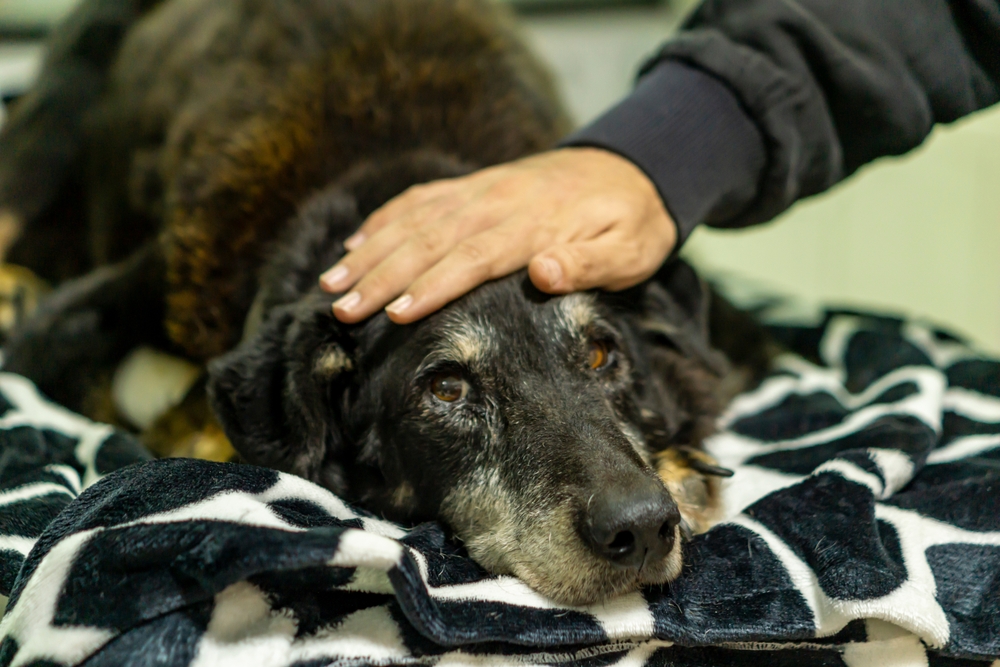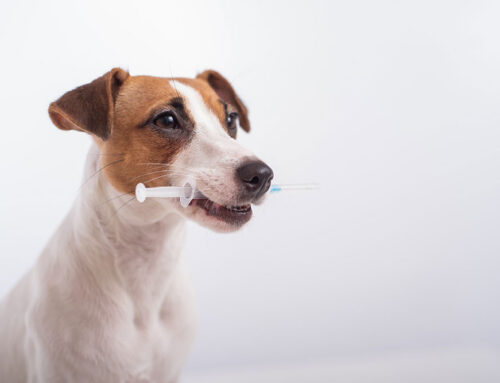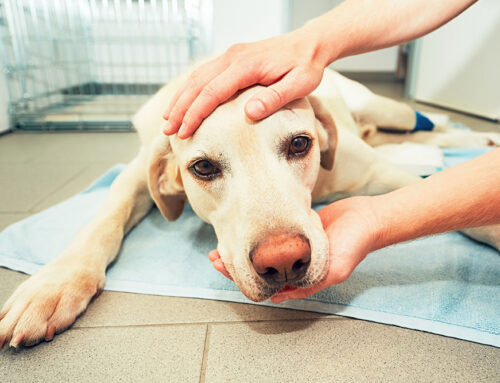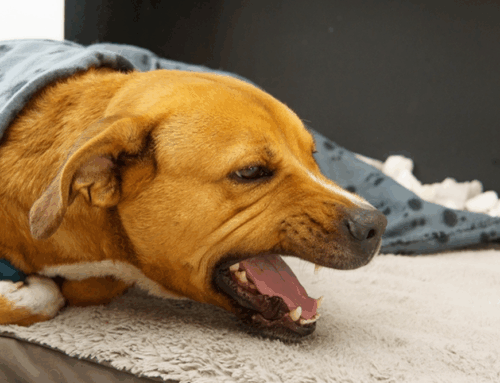Honoring Their Final Chapter: Comfort-Focused End-of-Life Pet Care
Saying goodbye is one of the most heart-wrenching parts of sharing life with a pet. These loyal companions are with us through every chapter: greeting us at the door, curling up at our feet, and quietly following us from room to room just to be near. So when the signs of aging or illness become undeniable, it’s natural to feel overwhelmed, uncertain, and even afraid of what lies ahead.
At Carolina Virginia Animal Hospital in Providence, North Carolina, we believe no pet owner should have to navigate this chapter alone. Our compassionate end-of-life pet care is designed to support families through difficult decisions, preserve each pet’s comfort and dignity, and provide the medical and emotional care every family deserves. In addition to end-of-life support, we also provide specialized geriatric care to help senior pets remain comfortable and healthy in their later years.
What Is End-of-Life Care for Pets?
End-of-life care is an approach that prioritizes comfort when a cure is no longer realistic or would only cause further suffering. This does not mean giving up. It means adjusting the focus from trying to fix what cannot be fixed to making each remaining day as comfortable as possible for your pet.
End-of-life pet care may include hospice care, palliative care, pain management, mobility aids, and help with daily needs like feeding and hygiene. In many cases, it also means preparing for euthanasia when it becomes the most loving choice. At Carolina Virginia Animal Hospital, we offer gentle euthanasia services with options for sedation, a quiet and private space, cremation or take-home burial, and memorial products to honor your pet.
Common Conditions That May Lead to End-of-Life Pet Care
Some conditions become chronic or progressive, making everyday life increasingly difficult for pets.
Examples of End-of-Life Conditions
- Cancer or Advanced Organ Failure – Many pets tolerate treatment for a while, but eventually pain or loss of function outweighs the benefits.
- Severe Arthritis or Mobility Loss – When an animal struggles to stand or walk without pain, their quality of life can decline quickly.
- Cognitive Dysfunction Syndrome – Older pets may become disoriented, anxious, or show signs of confusion.
- Advanced Heart or Kidney Disease – Conditions that cause persistent discomfort or repeated emergencies.
Knowing when to shift from treatment to comfort can feel impossible alone. This is where working closely with our team can help.
How to Recognize a Decline in Your Pet’s Quality of Life
One of the biggest questions families ask is, “How will we know when it’s time?” It is rarely a clear moment but more often a series of changes that add up.
Signs of Decline
The following are common signs that may indicate your pet’s quality of life (QOL) has shifted:
- Loss of interest in food, water, or social interactions
- Restlessness, confusion, or difficulty sleeping
- Persistent pain that medications no longer control
- Accidents in the house due to incontinence or mobility loss
- Withdrawal from activities they once enjoyed
Tools like the Quality of Life Scale can help you track these changes more objectively.
Have Frequent Conversations About Your Pet’s Quality of Life
Too often, families wait until a crisis to ask for help. But starting conversations early helps avoid emergencies and unnecessary suffering.
Benefits of Early Support
Early support for your ill or senior pet can make space for:
- Adjusting medications and adding comfort measures
- Planning ahead for difficult decisions
- Ensuring time for goodbyes without the panic of last-minute decisions
Early discussions concerning your pet’s condition and using pet QOL resources can bring clarity and more peace of mind when important decisions need to be made.
What to Expect During a Quality of Life Vet Visit
A veterinary quality of life consultation is about more than just test results or discussing your pet’s end-of-life options. It’s a chance to understand how your pet is truly feeling.
Components of a QOL Visit
| Part of the Visit | How It Helps |
| Physical Examination | Evaluates pain, mobility, and other comfort factors. |
| Bloodwork or Imaging | Helps determine organ function and progression. |
| Pain Scoring Tools | Objective measurements guide treatment choices. |
| Honest, Gentle Conversation | Gives you space to ask questions and express worries. |
At-Home Pain Management for Pets
Managing pain is at the core of end-of-life pet care. Pain is not always obvious, so watch for subtle signs like limping, changes in posture, or changes in how your pet interacts with the family.
Pain Management Approaches
- Prescription medications like NSAIDs or opioids
- Adjunct pain management therapies, such as acupuncture or laser therapy
- Mobility supports like ramps, non-slip pet rugs, or harnesses
- Simple changes to your home setup to reduce pet slips or falls
At Carolina Virginia Animal Hospital, we also offer nutritional support, cognitive care guidance, and senior wellness exams as part of our geriatric care services. These help identify pain early, manage chronic conditions, and maintain dignity for older pets.
End-of-Life Pet Care at Home
Practical support can make your pet’s daily life more peaceful and comfortable:
- Provide soft, clean bedding that supports joints
- Offer easily digestible, tasty food and encourage hydration
- Help with gentle hygiene and grooming to prevent skin sores
- Use familiar smells and gentle voices to calm anxiety
- Keep essentials like water, food, and litter boxes within easy reach
These small acts mean your pet stays comfortable and close to the family.
Euthanasia: A Compassionate Choice
No pet owner wants to think about euthanasia, but when a pet’s pain is constant or their world becomes too small to find joy, it can be the kindest decision.
What to Expect
Knowing what to expect during an euthanasia appointment can ease fear. Many helpful euthanasia guides exist that help explain how the process works, and provide tips on how to emotionally prepare for the procedure.
Remember: Choosing a gentle goodbye for your pet isn’t giving up. It shows deep love and respect for their comfort.
After Goodbye: Honoring Your Bond, Accepting Your Grief
Grief is real, and it is normal to feel lost after the loss of a beloved pet. Use pet loss resources to understand how grief can impact your daily life and explore additional grief support.
Memorial Ideas
Memorializing your pet, such as creating a memory box, planting a tree, or simply sharing stories with friends and family, can help families continue their bond with their pet after they’ve passed.
Grief isn’t a one-size-fits-all experience, and it doesn’t have a specific timeline. Be patient with yourself and your family, and show yourself the compassion and care you gave your pet.
FAQs: Pet End-of-Life Care
When should we consider euthanasia?
When pain or loss of mobility and joy outweigh good days. Talk it through early with our team.
How do I know my pet is in pain?
Look for subtle signs like changes in pet posture, appetite, or sleeping habits.
What if my pet passes naturally?
Some pets do, but many linger in discomfort. Humane euthanasia prevents unnecessary suffering.

Carolina Virginia Animal Hospital is Here to Help You Navigate Challenging Moments
At Carolina Virginia Animal Hospital, supporting families through their pet’s final chapter is an honor. Honest advice, medical support, and compassion are always part of the care our team provides.
Our veterinarians provide both geriatric care to keep senior pets comfortable for as long as possible and end-of-life services when the time comes to say goodbye. Whether you need pain management strategies, guidance about quality of life, or compassionate euthanasia, we are here to walk alongside you with respect and love.
If you are facing difficult end-of-life decisions, need to talk, or want help creating a plan, reach out to our team. Together, we can make sure your pet’s final days are filled with peace, comfort, and dignity.







Leave A Comment